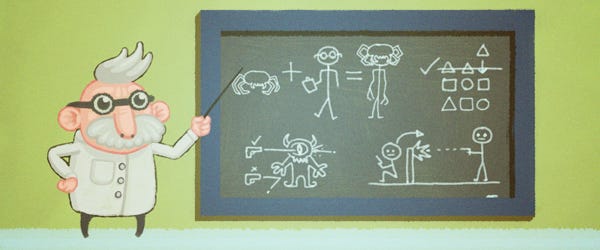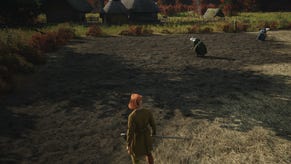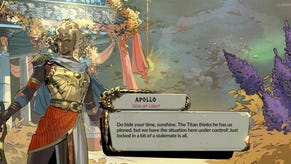The Very Important List Of PC Games, Part 5/5
As a retired don in the great university of the bedroom, I wasn't expecting to be aroused by Professor Rossignol. Later, I was also disturbed when he woke me up, demanding that I spout some waffle on the importance of some games none of the current faculty really felt able to talk about with confidence. Of course, with my famous arrogance, I felt confident to talk confidently about anything, and damn the fellow who says otherwise.
The rest of the faculty's chosen games may be found here. Oh, and I see those Intel chaps sponsored the whole thing! They certainly do have a sense for the purposes of ballyhoo.
These games are very important. If they weren't very important, they wouldn't be on a list that has been passed to me to write about it. This is how you can tell. You don't just let any game on a list. Magic stops it.
They are arranged in an order which I thought made some kind of narrative sense after I hammered this list out.
Guild Wars
RELEASE DATE: 2005
IMPORTANCENESS: Importantitudity.

Guild Wars is the game which freed the western mainstream industry from the ludicrous subscription dogma. Since it's release, subs games like World of Warcraft crumbled and... yeah, it wasn't like that. But Guild Wars did manage to find their own way, challenging pretty much every single one of those aforementioned dogmas in the always conservative MMO field, from the no-fee business, to the design to the purely technical. Things like the streaming client download are still impressive now. How its Magic-inspired character design brings decisions to the fore in a way which simply aren't there that early in any other game in its area - selecting from your available abilities to a genuinely different builds between missions in a close-to-completely-fluid way is its cornerstone, though there's lots more. It's a formalist masterpiece, which leads to its weaknesses - in concentrating so much on the sensible choices it sacrifices some of the magical sense of otherness of visiting another world, which involves swallowing a whole load of nonsense created by the company of idiots for the moments of transcendence.
Guild Wars has also proved important in a singular way. It allows you to swiftly identify the dumbest of the fucks by them making "Oh - you can't jump" jokes.
Further Reading: 4 Years On: Eric Flannum on Guild Wars.
Ultima Underworld: The Stygian Abyss
RELEASE DATE: 1992
IMPORTANCENESS: The gentleman's definition thereof.
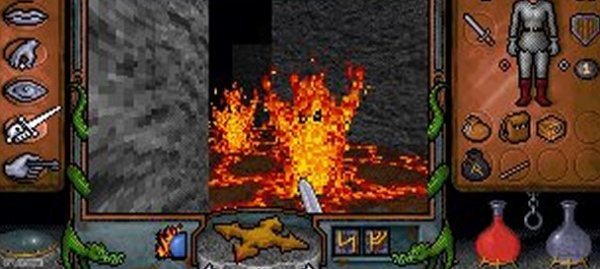
It's easy to play alternative histories. Looking Glass Studios working under their maiden name of Blue Sky Productions started here, and laid out their manifesto. It took Ion Storm a decade later to call it "The Immersive Sim", but back then, they were just making games the way they thought games should work. This was a simulation-lead dungeon-based game, which sits at the head of a tree which gave us at least five of the solid-gold classics in these lists. Texture mapping, multi-level dungeons - all the good stuff started herein. And it was a success. For the time, on the PC, an enormous 500K one. And then Doom came along, and changed all the rules. I often think of Doom as the Christ figure in PC Gaming. In a real way, anything before it is Old Testament and everything after it is the new one. Which leaves Ultima Underworld as the John the Baptist figure - if John the Baptist was kind of literary and chin-stroking, and Jesus was more into masturbating over his mighty chaingun. The future of games started here, and then took a sharp turn right. As such, it's the sort of game that makes a certain sort get all sniffly. We probably classify them as "The Older RPS Readers".
See also: Ultima Underworld II: Labyrinth of Worlds.
Further Reading: Ken Levine on Ultima Underworld.
Terra Nova
RELEASE DATE: 1996
IMPORTANCENESS: Importantitilowity.

And, yeah, sometimes an awesome developer is even better than they get generally credit for. Putting aside the groundbreaking groundtexturing Flight Unlimited games, Terra Nova is the Looking Glass classic that tends to fall out of the conversation a little. If it's important, it's important for that reason. As in, occasionally the simple story of a developers' brilliance is too simple. There's buried treasure to be unearthed. Terra Nova is a sci-fi ground-based Fantasical-simulator, sitting somewhere between the Mechwarrior games and a more traditional FPS in approach. You could even, if you squint, see its squad-based unit-set-up be a fore-runner of the Hidden & Dangerous school of soldier-sims. The primary difference is that Terra Nova's teams had jetpacks. You will never forget the Jetpacks, which makes me think of the book version of Starship Troopers. With its freeform find-your-own-solution levels, it was proof that the Looking Glass aesthetic could be applied to more than just men creeping around dark holes.
Sensible Soccer
RELEASE DATE: 1991
IMPORTANCENESS: Depends on where you were in the 1990s.

The flip of Terra Nova, in some ways. That's a work of relatively small critical reputation from a brilliant developer. This is the only game which has any recognition at all from a similarly brilliant developer. In RPS' widest remit - the one which believes PC=Personal Computer, hence covers everything back to the first 10 PRINT "KIERON IS COOL" 20 GOTO 10 - Sensible would define its part of the age as surely as Looking Glass defined its. Sensible Software were everything that was good and great about the Amiga. It really is that simple. And Sensible Soccer was their pop-crossover hit.
It's a game about Foot To Ball. I didn't really get foot-to-ball before playing it. I did afterwards. It's crisp and funny and perfect, and is an important game in terms of thinking how you can approach a subject matter in many different ways, to different aesthetic effects.
Further Reading: Sensible Soccer, Foot-to-ball and me.
See Also: Kick off 2. If you're WRONG IN THE HEAD.
Football Manager ("Championship Manager" up to the end of 2004)
RELEASE DATE: 2005 (1992)
IMPORTANCENESS: Directly Proportional To Your Foot-To-Ball love.

The 90s flip of Sensible Soccer, but proving the similar lesson - as in, you can look at the same inspiration and work out however many different games from it. Where Sensible Soccer thought of the player and the pure-platonic nature of how a game flows, Sports Interactive sat on the bench, and tried to make a universe out of numbers. It's not a game that any of RPS truly loves - I drifted away from pure football sims after the brilliance of the original 1982 FM.
But that doesn't mean we're not stupid enough to see the fantasies it allows you to explore. Its mass of detail creates a sense of authenticity, adding verisimilitude to the frustrated football fan's exploring of alternative dimensions where their team doesn't suck quite as horrifically. And that's a simplification - yes, there's the "I WILL MAKE MY TEAM WIN!" aspect, but when I talk to FM fans, it's as much about the more mundane triumphs. It's a game which embraces both the glory and the grey, drizzle-coated 0-0 matches. It understands football in a different, but equally profound way, as Sensible Soccer.
Talking personally? For a game which we make affectionately mocking spreadsheet-based jokes about, I can't help but remember that it's the only game that a good chunk of my quote-unquote cool friends play at all. I mean, FFS: we got Gareth Los Campesinos! to review it for us in the last edition. This game has been part of several generations of British Male's relationships with games and the game. You have to applaud it. It's a game that entirely embodies a certain perspective of the football-fanatic
Further Reading: Gareth Campesinos! Reviews Football Manager 2011.
Company Of Heroes
RELEASE DATE: 2006
IMPORTANCENESS: Unforgettable.
We were all pretty burned out on WW2 RTS games by 2006. It took about half an hour with Company of Heroes to realise the error of that - we were just tired out with tired-out RTS games. And Company of Heroes, ideas were plain rampant. Putting aside its pummelling atmosphere, its genius was in turning traditional unit interactions into something that felt absolutely real. Positioning machine-guns to cover areas, so stopping head on assaults by infantry felt, so leading them to trying to outflank you, so leading you to try and protect the flanks leading to... well, from the individual, robust pieces a RTS which felt a lot like WW2 emerged. In some ways, you could say it's the Sensible Soccer of WW2. It's easy to argue this as the apex of the classical RTS from Relic's hands - after this, they went a little less classical with DoW2. It's almost as easy to argue this as the apex of classical RTS full stop.
Galactic Civilizations II
RELEASE DATE: 2006
IMPORTANCENESS: Company defining.

Basically, if RPS had a model of what we wanted (larger) PC developers to be like in our early years, there was a couple of candidates. One was Valve. The other - and more achievable example - was Stardock. You know - Pragmatically uncaring about piracy, rejecting DRM in favour of actually improving the after-release service to the people who do actually buy your game, altering budgets to serve a demographic rather than rejecting a genre as dead so serving a still game-hungry audience. That kind of thing. While the bloom's off their rose a little after Demigod and Elemental, Galactic Civilization II remains their truest statement of intent. A sprawling child of Master of Orion and Ascendancy, this was hyper-smart and enormous, especially when you worked in the increasingly ambitious add-on packs. Get the complete pack, and you'll be marvelling how Twilight of the Arnor customises each of the alien's Civ-esque tech-trees to transform this mechanism into a storytelling device.
Further Reading: The only article with the "Slavery gets a bad press but has a lot going for it" tag.
Freespace 2
RELEASE DATE: 1999
IMPORTANCENESS: High, in a tragic way.
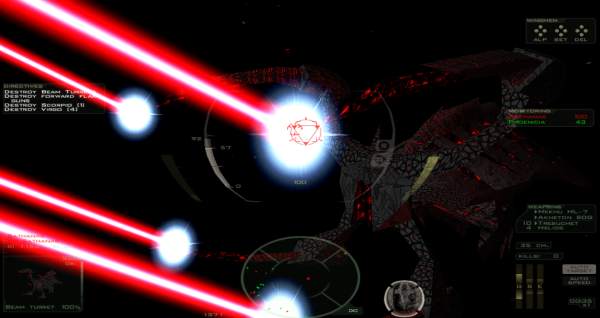
It killed a genre. That makes it pretty important, yeah?
Okay, that's not really fair or even true, but it feels like it. Before Freespace 2, there was a regular turn-over in space-based slower-paced faux-authentic shooter games, stretching back to the codification of the genre with Origin's Wing Commander. Afterwards, just Starlancer and a handful of games that are more derived from Elite in their shooty/tradey/explorey-ness. Now other games have been described as enormous failures - like the above Terra Nova - but Freespace 2 turned over less than 30K in the first six months on sale in the US. The genre was stone dead. Which makes its genre somewhat unusual - it's a genre that ended with its absolute apex. Normally you get a peak, and a slow falling away of critical and consumer interest. Freespace 2 was simply the best space-fighter game the world has ever seen. And no-one tried to follow it.
I half suspect someone will be trying in the near future. Someone akin to Stardock in philosophy will turn their attention to it, as there's a clear need there which could be filled. The odd thing is that it is being filled by its community. Since the code was released, the game's being kept alive by a loving fanbase. Get a copy from GoG, load in the mods and take the fight to the sky beyond the skies.
Further Reading: +11-12 Years: Starcraft 2 Versus Freespace 2
Age of Empires II: The Age of Kings
RELEASE DATE: 1999
IMPORTANCENESS: Bigger than we ever admit.
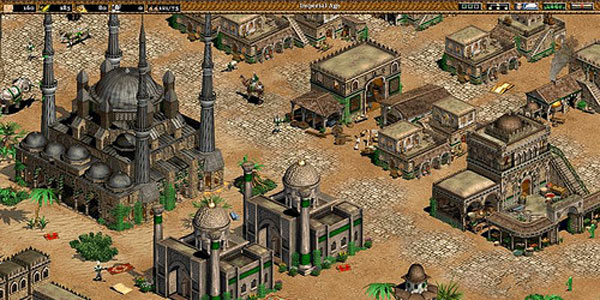
If we're really talking about Importance, we're really giving credit for the first game which did the majority of the heavy lifting, both in terms of the actual game and of industry impact. For a game about history, you have to put it in the context of history. Microsoft had only recently stepped into making games. Their first wave were generally regarded as laughable (Two words: Microsoft Soccer). It's only the pure blue-chip quality of Age of Empires which actually made Microsoft into a reputable publisher of software. People talk about Halo's impact with the Xbox - and rightly so - but Age of Empires is the first moment you really knew Microsoft were a serious player (both in terms of quality as well as the never-doubted cash). As a game, it did nothing less than take Civilization and hit it into the side of the Warcraft/C&C-esque RTS. When we live in a world where we laugh at yet another WW2 RTS, it's worth remembering what that actually means. Age was the first really successful RTS which had a quasi-realistic take on a realistic setting. Before it, it was all fantasy and Sci-fi. In a real way, Age of Empires was the Call of Duty of its genre. Not realistic, but thematically evocative of a real time and place, and so gaining a whole different sort of appeal.
This is all the original. We'll say the second one, as it sold enormously and was just plain better. If you're going to go back to one of the classic Age games, this is where we'd guide you.
See also: Rise of Nations.
Urban Chaos
RELEASE DATE: 1999
IMPORTANCENESS: As a historical quirk.

You may think this is an odd one. But I think that pendulous bulb you call a nose is an odd one, but I'm too polite to bring it up. Whatever could have been going through the current faculty of RPS' mind when selecting Mucky Foot's not-swan-song for listosity? Well, it's one of those games which, on the quiet, managed to be ahead of its time. While Jim saw Syndicate's importance fade as time went by, as I've previously argued, I consider it the direct forefather of the modern open world game - specifically, the living city aspect (married to the often salubrious tone of the game). Urban Chaos, created by Bullfrog veterans, is the missing link between Syndicate and Grand Theft Auto 3. Urban Chaos took Tomb Raider and put the acrobatic character deep in a living urban environment - plus pretty-elaborate hand-to-hand combat, shooting and driving. The setting was there. Only the level based structure had to be jettisoned, and the Open World renaissance could have started two years (and one console-format) earlier. Even without this, and somewhat iffy controls, it's a quiet technical tour de force.
The second reasons is just its embracing of the culture, assuming that people were cool enough to deal with this sort of stuff now. Its lead, Darci Stern... well, there's painfully few black leads in games. Even making a female lead still raises an eyebrow in some circles. And considering putting her in clothes is always going to create uproar in the fapp-ering classes. A fully dressed professional black-woman? Fucking lunacy. They did it anyway, because it shouldn't be a big deal. And a decade on, I'm still sad Mucky Foot were wrong.
I'll give you one more personal thing. When you left the blaring club scenes, they dropped the pounding music to a barely audible whisper, then slowly faded it back up as you ran away. It's something that anyone who's fell out of a club into the cold, quiet streets would recognise. And I'm always going to raise a glass to that.
Further Reading: Footprints: The Fall Of Mucky Foot.
Dwarf Fortress
RELEASE DATE: 2006 (Initial)
IMPORTANCENESS: If You Have To ASCII, You'll Never Know.
Dwarf Fortress sits at the furthest tip of the development brought to the gaming mainstream by Bullfrog's Populous. The indirect-control management/construction game, with an eye on physical simulation rules. Except Dwarf Fortress is that taken to simply ludicrous degrees. I've been known to compare Toady's opus to Proust's Remembrance of Things Past, in terms of monomanical devotion to a singular vision informed pretty much entirely by your own interests. Dwarf Fortress is the designer as God, trying to create a machine which creates universes from a seed of a number at a button-press.
Dwarf Fortress is important because it's fucking insane. It's important because it's against every single rule the industry makes. It's important because it shows that a designer/coder, if they choose to stay to their passions - even their most extreme passions - it's just about possible you can find an audience. It proves that being sensible is a small master for small minds. I still have trouble believing that Dwarf Fortress even exists.
I do know their fans exist though, which is why I make an ASCII gag in the tagline, knowing it always gets their backs up. Yes, I know the real ANSI.
Further Reading: The Song Of Onionbog: Quinns' Dwarf Fortress Diary.
In Memoriam
RELEASE DATE: 2003
IMPORTANCENESS: ALL ENCOMPASSING, SEZ US EGOTISTICALLY.

I'm not entirely sure RPS would exist without In Memoriam, but I'll get to that.
In Memoriam is a French adventure. It basically brings some of the pleasures of the ARG to a classical point and click adventure. The set up is that someone has gone missing, and the police's only clue is a CD-ROM thing. It's full of puzzles, each of which unlocks the next step. They can't decode it, so they've released it in hope that someone out there will be able to do it. Enter you. Now, so far so normal - its twist is that the puzzles often require you to use the web to find out information. The developers created a mass of fake sites hiding the information. Not knowing whether you are actually at a "real" site or one that's part of the game added to the level of oddness. And, since it has your e-mail, receiving e-mails from your fellow hunters of - er - other people is a unique opportunity for chills. And chills they are - this was a genuinely scary game, in its own way.
(Also, kinda ruined when FAQs started to appear, which turned up when you searched for clues. I'm not sure if the game's sites are still up, but if you play it, add something to your searches so it doesn't go to any page with the words "In Memoriam" on, which should help maintain its atmosphere.)
Anyway - brilliant little game. Its UK Publisher - Ubisoft - clearly didn't agree. They didn't send any review copies out to anyone. Walker only ended up playing it because I commissioned him to write it as I grabbed it from the shops when trying to fill the pages on PC Gamer. And he comes back amazed - this is actually really fucking good. Except, being John, he probably didn't swear. This lead to us shouting how good it was to other magazines, and getting it reviewed all over the place. We'd discovered a game, and brought it to people who wouldn't know anything about it without us shouting about it. I realised that in my time at Gamer, I'd only ever really had a chance to do that twice - once with In Memoriam, and once with Uplink. Why didn't we get to do this more? Wouldn't be awesome to have a venue to do this more often?
It was the final puzzle that In Memoriam presented us, but we solved it eventually.
This feature has been kindly sponsored by:

